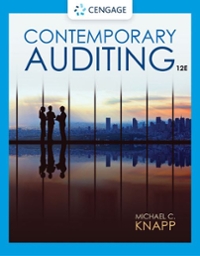Question
Delsing Canning Company is considering an expansion of its facilities. Its current income statement is as follows: I have everything but D. Sales $ 6,200,000
Delsing Canning Company is considering an expansion of its facilities. Its current income statement is as follows: I have everything but D.
| Sales | $ | 6,200,000 |
| Variable costs (50% of sales) | 3,100,000 | |
| Fixed costs | 1,920,000 | |
| Earnings before interest and taxes (EBIT) | $ | 1,180,000 |
| Interest (10% cost) | 440,000 | |
| Earnings before taxes (EBT) | $ | 740,000 |
| Tax (30%) | 222,000 | |
| Earnings after taxes (EAT) | $ | 518,000 |
| Shares of common stock | 320,000 | |
| Earnings per share | $ | 1.62 |
The company is currently financed with 50 percent debt and 50 percent equity (common stock, par value of $10). In order to expand the facilities, Mr. Delsing estimates a need for $3.2 million in additional financing. His investment banker has laid out three plans for him to consider:
- Sell $3.2 million of debt at 14 percent.
- Sell $3.2 million of common stock at $20 per share.
- Sell $1.60 million of debt at 13 percent and $1.60 million of common stock at $25 per share.
Variable costs are expected to stay at 50 percent of sales, while fixed expenses will increase to $2,420,000 per year. Delsing is not sure how much this expansion will add to sales, but he estimates that sales will rise by $1.60 million per year for the next five years. Delsing is interested in a thorough analysis of his expansion plans and methods of financing.He would like you to analyze the following:
a. The break-even point for operating expenses before and after expansion (in sales dollars). (Enter your answers in dollars not in millions, i.e, $1,234,567.) Before Expansion:
After Expansion:
b. The degree of operating leverage before and after expansion. Assume sales of $6.2 million before expansion and $7.2 million after expansion. Use the formula: DOL = (S TVC) / (S TVC FC). (Round your answers to 2 decimal places.)
Before Expansion:
After Expansion: c-1. The degree of financial leverage before expansion. (Round your answers to 2 decimal places.)
Degree of financial leverage: c-2. The degree of financial leverage for all three methods after expansion. Assume sales of $7.2 million for this question. (Round your answers to 2 decimal places.)
100% Debt:
100% Equity:
50% Debit 50% Equity:
d. Compute EPS under all three methods of financing the expansion at $7.2 million in sales (first year) and $10.1 million in sales (last year). (Round your answers to 2 decimal places.)
100% Debt:
100% Equity:
50% Debt 50% Equity:
Step by Step Solution
There are 3 Steps involved in it
Step: 1

Get Instant Access to Expert-Tailored Solutions
See step-by-step solutions with expert insights and AI powered tools for academic success
Step: 2

Step: 3

Ace Your Homework with AI
Get the answers you need in no time with our AI-driven, step-by-step assistance
Get Started


